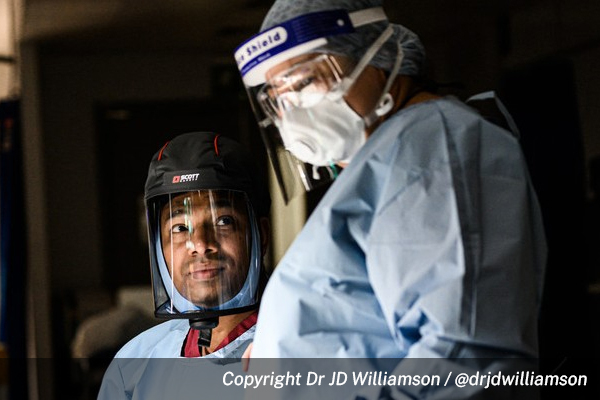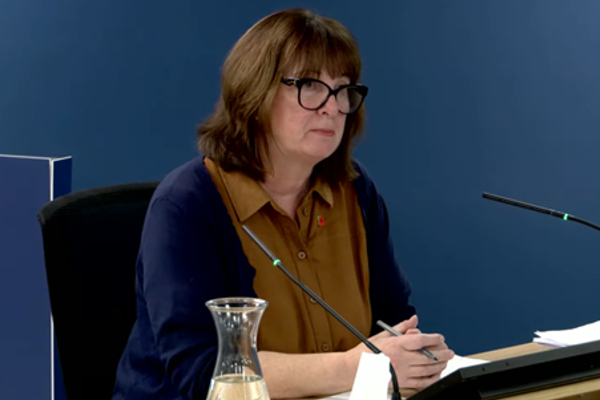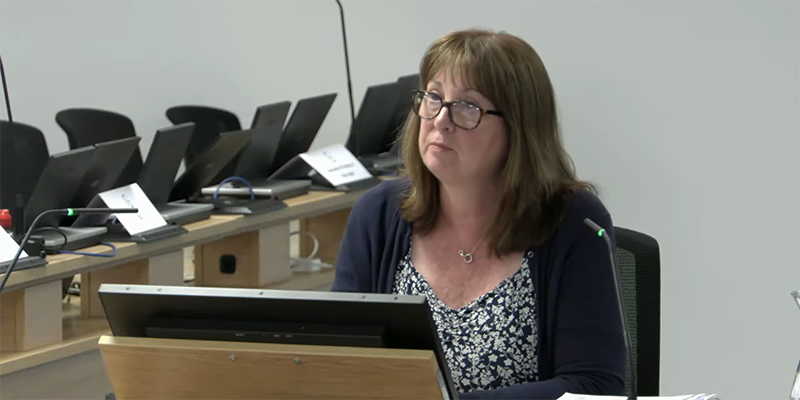
The RCN and the UK COVID-19 Inquiry
Supporting members to share their experiences in an independent inquiry
As nursing and midwifery staff, our members were at the centre of the UK’s pandemic response.
The UK COVID-19 Inquiry is a UK-wide independent inquiry into the response to and impact of the pandemic.
The inquiry is chaired by Baroness Heather Hallett, a former Court of Appeal judge. It’s expected to run until 2026. Alongside this inquiry, a separate Scottish inquiry is being run by the Scottish government. The inquiries will share relevant information to avoid duplication.
Here at the RCN, we have an important role to play in making sure the voice of nursing is heard during both the UK-wide and Scottish inquiries. We support any member who wants to take part as they share experiences, ask questions and raise concerns.

Our role as a ‘core participant’
We take our role so seriously that we successfully applied to become a ‘core participant’ in both the UK-wide inquiry and the Scottish inquiry. This gives us special rights, such as:
- receiving documentation
- being represented legally
- making legal submissions
- suggesting questions
- receiving advance notice of the inquiry’s report
With these additional rights, we can do more to make sure our members’ experiences are properly acknowledged. And we can ensure members feel informed and supported when the impact of the pandemic on healthcare is considered.
Take part in the inquiry – because every story matters
The inquiry wants to hear from anyone willing to share their experiences of working in health and social care during the pandemic.
Every story shared will be used to shape the inquiry’s investigations and help us all to learn lessons for the future.
COVID inquiry: 'Why were RCN warnings ignored?'
Nursing testimony at the COVID-19 Inquiry has highlighted how the failure to listen to the nursing profession led to inadequate infection prevention guidance and improper supply of PPE, putting staff at risk.


Nursing staff were put at risk before and during COVID-19 and we remain unprepared for any future emergence of COVID-19, or any other health emergency.
The UK COVID-19 Inquiry and its findings will be crucial to shape the country's future plans for pandemic preparedness.
Module 1 report: emotional reading for nursing staff
The inquiry has published its first report and set of recommendations, highlighting significant flaws in pandemic preparations which meant COVID-19 caused more deaths than it should have.

Learn more about the inquiry
The inquiry is split into modules. The first 6 are in progress. More modules will follow.
In module 1, the inquiry explored how prepared the government was for the pandemic. It investigated how the government managed and made decisions about the risk of a Coronavirus pandemic. The hearings are now over. The inquiry's report will follow.
Module 2 began in October 2023. The inquiry looked at the UK’s initial response to the pandemic. It explored how the UK government made decisions and the effectiveness of its relationships with devolved governments, local authorities and the voluntary and community sectors.
In module 3, the inquiry examined the impact of COVID-19 and the UK’s response to it in health care systems. Our members gave evidence in this module.
Module 4 covered vaccines and therapeutics and module 5 covered government procurement.
Module 6 covers staffing in the care sector. It's running in summer 2025 and we're giving evidence.
FAQs
Check out the inquiry website, or read answers to some frequently asked questions below.
The inquiry will examine, consider and report on the preparations for and response to the COVID-19 pandemic in England, Wales, Scotland and Northern Ireland, up to 28 June 2022.
The inquiry broadly aims to cover:
- The public health response across the whole of the UK
- The response of the health and care sector across the UK
- The economic response to the pandemic and its impact
With this new understanding, the inquiry will set recommendations to inform the response to any future pandemic across the UK.
Read the full scope of the inquiry on the COVID-19 inquiry webpage.
The UK COVID-19 Inquiry will consider the response in areas affecting the whole of the UK, such as:
- social security schemes
- immigration and asylum
- product safety
- health and safety at work
- employment rights and duties
The Scottish inquiry will consider devolved responses to the pandemic in areas such as:
- education
- health
- welfare assistance
- financial support
The two inquiries will liaise with each other throughout to minimise any duplication. They have agreed principles of co-operation and the practical steps they will take to achieve them.
You can take part in the inquiry’s listening exercise.
If you need advice on giving additional evidence, please complete our online form first. We can help you decide whether your contribution falls within the remit of our submission to the inquiry.
Please complete our online form for a referral if you are contacted by the Inquiry as a witness.
If you receive a formal “Rule 9” request from the Inquiry, the RCN’s Public Inquiry team can provide advice and support in drafting your statement and/or pulling together any relevant documents. You might receive this request if, for example, you took a leading role in developing your employer’s response to the COVID-19 pandemic or if you have specific expertise or insight.
As a procedure designed to understand wider events that stretch beyond the actions of any single person, public inquiries are not proceedings in which witnesses are legally represented. The RCN Public Inquiry team will be able to talk through the Inquiry process with a witness and can provide support in advance of a witness giving evidence, however, the RCN cannot appoint a solicitor to act on your behalf in this instance.
The Inquiry must send a “rule 13 warning letter” to anyone who is likely to be the subject of criticism. If you receive a rule 13 warning letter, please complete our online form for a referral.
A Core Participant is a person or organisation which will play a key role during the Inquiry process. In deciding whether to designate a person as a Core Participant, the Chair will consider whether the party played a direct and significant role in relation to the matters to be dealt with in that module, whether they have a significant interest in an important aspect of those matters and whether they may be subject to explicit or significant criticism.
Core Participants in Modules 1 to 3 of the UK Inquiry include:
- Bereaved families’ groups
- Public health bodies
- Government ministers and departments
- Charity groups
If you believe you should be a Core Participant in the Inquiry, please complete our online form for a referral to the Public Inquiry team. Our lawyers can talk you through the pros and cons of applying for Core Participant status, discuss which module(s) might be most relevant and can help you secure independent legal representation if the application is granted.
Core Participant status will be granted on a module-by-module basis. Determinations have already been made in respect of Modules 1 to 3. Further modules are yet to be announced.
Members who achieve Core Participant status in their own right are entitled to separate legal representation. The RCN can advise and assist members in applying for funding from the Inquiry to meet the cost of their independent representation.
This is the biggest public inquiry the UK has carried out. It will take several years to complete and was opened formally without a fixed end date.
Stay up to date with the latest developments
-
 20 Mar 2024
20 Mar 2024
COVID inquiry: RCN presents evidence on testing, PPE and staffing in the care sector
Care services were chronically under-resourced to deal with pandemic pressures and lessons must be learned, we told the inquiry.
-
 27 Sep 2023
27 Sep 2023
COVID inquiry: RCN makes submissions in preliminary hearing
We’re asking for long COVID to be recognised in disability law and for health care workers with ongoing health issues to be properly compensated.
-
 26 Jun 2023
26 Jun 2023
RCN expert declares pandemic preparedness ‘inadequate’ in evidence to COVID inquiry
Infection, prevention and control specialist nurse Rose Gallagher said the UK government planned for the wrong pandemic, didn’t act on learnings from previous outbreaks and failed to prepare the right protective equipment for respiratory infections like COVID-19.





